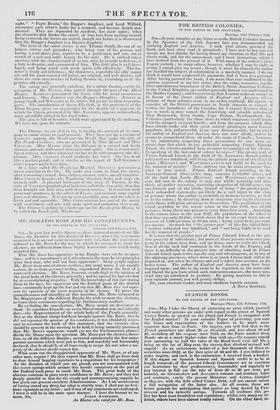THE BRITISH COLONIES.
TO THE EDITOR OF THE annTAxon.
Hastings, 18th February 1834.
Sze—In your remarks on my letter as to the British Colonies inserted in the Spectator of the lhh January last, you recommended may studying England and America. I took your advice, procured the book, and have since read it attentively : I have now to beg you will accept my best thanks for having drawn my attention to that able and clever work, and for the amusement, and I trust instruction, which I have derived from the perusal of it. With many of the author's views I agree entirely ; to many others, however, whether I may be right or wrong I cannot give my assent ; though it must be allowed the author has handled the subject of colonization in a masterly manner.. I do not think it would have weakened his argument, had it been less personal. After having perused the book, I am more than ever confirmed in the opinion expressed in my last letter, that the value, resources, capabi- lities and immense importance of the British North American Colonies to the United Kingdom, are neither generally known nor understood in the Mother Country ; and I regret to say that I cannot make an except ;WI in favour of the clever author of England and America, whose notions of those colonies seem to me rather confused. Ile appears to consider all the British possessions in North America as :compri within the boundaries of the Canadas, for I cannot discover that oe has so much as once named the flourishing and valuable colonies of New Brunswick, Nova Scotia, Cape Breton, Newfoundland, &c. Colonies (particularly the three first) to which emigrants could resort with the prospect of great benefit ; and from the progress which they have already made, and their great natural advantages must become populous, rich, and powerful, at no very distant period ; but to which the author of England and America, does not once allude, unless he means to comprehend them all under the name of Canada ; however, if his information respecting those possessions be not more ac- curate than that which he has published respecting Prince Edward Island, the colonies omitted have no cause to complain of his silence. In speaking of the last-named colony he says—" The greater part of Prince Edward Island, in the Gulf of St. Lawrence, though neither cultivated nor inhabited, still being the private property of two English Lords (Mnsvists and W.EsTsioitEsaND) is not liable to be used for the removal of people." Now, nothing can be more erroneous than what is here stated. Prince Edward Island according to the Surveyor-General Housusn's map, contains 1,666,000 acres ; and all the land that Lords Mesvii.ss and WESTMORELAND OWII or ever did own in the colony is only one whole township and two- thirds of another township, consisting altogether of 36,6:32 acres ; not one-fortieth part of the whole, instead of being "the greater part." Such smfounded statements, are likely do a vast injury to the class of persons whom the author is evidently so desirous to serve, as well as to the colony ; by diverting from it emigrants who might otherwise settle there, with great advantage to themselves. The population of the island according to the census taken in the year 1833, was 32,292 rcrsons ; being about one person to every forty-two acres. .According to the census taken in the year 1827, the population of the island at that time was only 23,266 ; which shows that in six years there was an increase of 9,026 persons, or :39 per cent. ; being equal to 61 per cent. per annum. So much for " the greater part" of this fine island being " neither cultivated nor inhabited," and " not being liable to be used for the removal of people."
It is true that the greater part of Prince Edward Island is the pri- vate property of' individuals ; but most of those persons who own pro- perty in the colony have dune, and are doing, more to settle the island, than if all the land had continued in the hands of the Crown ; and there is no difficulty at the present time of obtaining land in Prince Edward Island upon terms equally easy and advantageous, as in any of the adjoining provinces, where there is so much Crown land still to be disposed of, and when its climate and soil is taken into account, on far better terms. The author of England and America must have been imposed upon ; and this is the more to be regretted, as the more able and liberal the pen from which such statements emanate, the more mis- chief they are calculated to produce. By giving insertion to this in your valuable journal, you will greatly oblige, Sir, your constant reader, and most obedient humble servant, A NOVA SCOTIAN'.




















 Previous page
Previous page